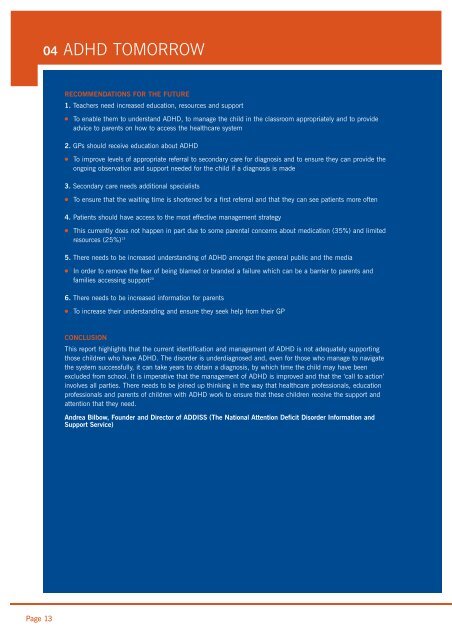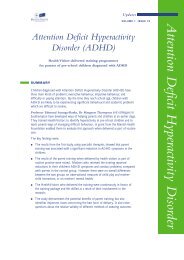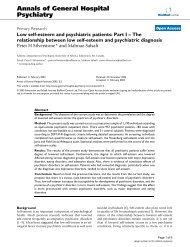04 ADHD TOMORROWRECOMMENDATIONS FOR THE FUTURE1. Teachers need increased education, resources and support●To enable them to understand ADHD, to manage the child in the classroom appropriately and to provideadvice to p<strong>are</strong>nts on how to access the healthc<strong>are</strong> system2. GPs should receive education about ADHD●To improve levels of appropriate referral to secondary c<strong>are</strong> for diagnosis and to ensure they can provide theongoing observation and support needed for the child if a diagnosis is made3. Secondary c<strong>are</strong> needs additional specialists●To ensure that the waiting time is shortened for a first referral and that they can see patients more often4. Patients should have access to the most effective management strategy●This currently does not happen in part due to some p<strong>are</strong>ntal concerns about medication (35%) and limitedresources (25%) 135. There needs to be increased understanding of ADHD amongst the general public and the media●In order to remove the fear of being blamed or branded a failure which can be a barrier to p<strong>are</strong>nts andfamilies accessing support 206. There needs to be increased information for p<strong>are</strong>nts●To increase their understanding and ensure they seek help from their GPCONCLUSIONThis report highlights that the current identification and management of ADHD is not adequately supportingthose children who have ADHD. The disorder is underdiagnosed and, even for those who manage to navigatethe system successfully, it can take years to obtain a diagnosis, by which time the child may have beenexcluded from school. It is imperative that the management of ADHD is improved and that the ‘call to action’involves all parties. There needs to be joined up thinking in the way that healthc<strong>are</strong> professionals, educationprofessionals and p<strong>are</strong>nts of children with ADHD work to ensure that these children receive the support and<strong>attention</strong> that they need.Andrea Bilbow, Founder and Director of ADDISS (The National Attention Deficit Disorder Information andSupport Service)Page 13
ADHD: PAYING ENOUGH ATTENTION?A RESEARCH REPORT INVESTIGATING ADHD IN THE UK05 REFERENCES1. Green C and Chee K. Understanding ADHD – A P<strong>are</strong>nt’s Guide to AttentionDeficit Hyperactivity Disorder in Children. Vermillion Publishing 1997.ISBN 0 009 181700 52. Practice Parameter for the Assessment and Treatment of Children, Adolescentsand Adults with Attention-Deficit/Hyperactivity Disorder. J Am Acad Child AdolescPsychiatry: 36:10 85S-119S3. American Psychiatric Association Press. Diagnostic and Statistical Manual ofMental Disorders (DSM-IV). Washington (DC): The Press; 19944. National Institute for Clinical Excellence. Technology Appraisal Guidance –No. 13. Guidance on the Use of Methylphenidate (Ritalin, Equasym) forAttention-Deficit/Hyperactivity Disorder (ADHD) in childhood. October 20005. Scottish Intercollegiate Guidelines Network, 52 Attention Deficit and HyperkineticDisorder in Young Children: A National Clinical Guideline, June 2001,http://www.sign.ac.uk/pdf/sign52.pdf6. Berry CA et al. Girls with Attention Deficit Disorder: A Silent Minority? A Report onBehavioural and Cognitive Characteristics. Pediatrics: 76 (5), November 19857. Population Projections by the Government Actuary. United Kingdom, 20038. World Health Organisation. The ICD-10 Classification of Mental and BehaviouralDisorders: Clinical Descriptions and Diagnostics Guidelines. Geneva, WHO,pp 155-157, 19939. Zametkin A and Liotta W. The Neurobiology of Attention-Deficit/HyperactivityDisorder. J Clin Psychiatry: 59 (7):17-23, 199810. Bush G, Frazier JA, Rauch SL, Seidman LJ, Whalen PJ, Jenike MA, Rosen BR,Biederman J. Anterior Cingulate Cortex Dysfunction in Attention-Deficit/Hyperactivity Disorder Revealed by fMRI and the Counting Stroop.Biol Psychiatry: 45 (12):1542-52, 199911. Castellanos Xavier F. MD et al. Developmental Trajectories of Brain VolumeAbnormalities in Children and Adolescents With Attention-Deficit/HyperactivityDisorder JAMA: 288:1740-1748, 200212. Taylor E. Medical Research Council,http://news.bbc.co.uk/1/hi/health/212497.stm13. Synergy Healthc<strong>are</strong> Research: ‘ADHD in the UK Today.’ Survey of 50 child andadolescent psychiatrists and 75 paediatricians, July 200314. S<strong>we</strong>nsen AR et al. Increased Risk of Self-Injury and Suicide for Patients withAttention-Deficit/Hyperactivity Disorder MEDTAP Report: ADHD has a SignificantBurden Upon the Individual, Family, and Society in Europe. Presented at the15th European College of Neuropsychopharmacology (ECNP) Congress,Barcelona, Spain, October 200215. International Consensus Statement on ADHD. J Am Acad Child AdolescPsychiatry: 41(12):1389, 200216. NIH Consensus Statement, Diagnosis and Treatment of Attention DeficitHyperactivity Disorder (ADHD), 16(2), November 199817. Remak E. Attention Deficit/Hyperactivity Disorder: Burden of Illness, UnitedKingdom, MEDTAP International, 200218. The MTA Cooperative Group, A 14 Month Randomised Clinical Trial of TreatmentStrategies for Attention-Deficit/Hyperactivity Disorder, Arch Gen Psychiatry:Vol 56. December 199919. As assessed by Lilly UK using IMS Disease Analyser – Mediplus UK Data April200320. Meltzer H et al. Persistence, Onset, Risk Factors and Outcomes of ChildhoodMental Disorders, Office for National Statistics, 2003,http://www.doh.gov.uk/public/pmachildpersist_v4.pdf21. Klasen H, Goodman R. P<strong>are</strong>nts and GPs at Cross-Purposes over Hyperactivity:A Qualitative Study of Possible Barriers to Treatment. British Journal of GeneralPractice: 50 (452):199-202, 200022. Attention-Deficit/Hyperactivity (AD/HD): Guidelines and Principles for SuccessfulMulti-Agency Working, Report of a Working Party, The British PsychologicalSociety, 2000, http://www.bps.org.uk/documents/ADHD.pdf23. Audit Commission, ‘Children in Mind’ Child and Adolescent Mental HealthServices, 199924. B<strong>are</strong>n M. Multimodal Treatment for ADHD. Patient C<strong>are</strong>: 77-95, December 199525. Jensen P et al. Psychoactive Medication Prescribing Practices for US Children:Gaps Bet<strong>we</strong>en Research and Clinical Practice. J Am Acad Child AdolescPsychiatry: 38 (5): 557-565, 199926. Special Educational Needs Code of Practice, Department for Education and Skills,November 2001, http://www.dfes.gov.uk/ (Special Educational Needs Code ofPractice 2001)27. Dale C and Storey L. Nursing Praxis-C<strong>are</strong> and Treatment of Offenders with aLearning Disability. ISBN 1 903625 13 0M749Page 14




